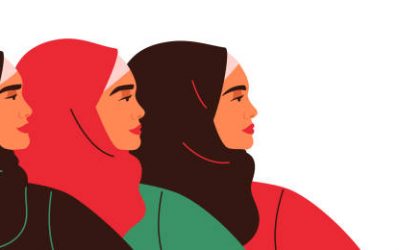Zeinab series
Amina’s life story
_____________________
episode 1
♦♥♦
By Zeinab ZAZA
Translated from French by Françoise Thibaut
_______________________________

I don’t know about you but when I watch my series on youtube, I can even forget to go to the loo. So, well, I have forgotten the time for prayer once more.
What? Yes, prayer. Let me digress to tell you how great it is to be a Muslim woman in France. First you aren’t disturbed by the call to prayer, which isn’t always melodious, far from it. If you can’t do without it, you can always download the ap. Then we are protected by the laws of the republic, I mean the French republic, the one that’s secular. In Egypt too,may God be with her, we have a republic but it isn’t secular.
That is here we don’t have to fear polygamy nor one-sided repudiation nor that your brothers should inherit twice as much as you. Apart from that you can do what you like; you can practice an aesthetic, Sufic Islam, a cute Islam as we say in Egypt, yes, we use an English word.
End of parentheses. Let’s get back to my series – Will the old millionaire marry the dancer? Will he rich divorcée marry her coach? The suspense is unbearable. Egyptian series never get tired of stories of mismatches, which reminds me of one of my childhood friends, a friend who stayed over there, and when I think of her, I feel sad. You’ll understand why.
Like me, she was born in the 50s in a very respectable family, a well-off family, enlightened parents and schooling in French.
She was beautiful, serious and bright and, of course, she went to medical school. She lost her father when she was about fifteen; she loved her father who had given her a high sense of her own value and of the responsibility incumbent on her social class, the compensation for her privileges.
But then she meets a boy who looks like Henry Fonda with darker hair and she falls in love with him. Up to now all is well. He is an engineer, the son of a high ranking civil servant close to president Anouar El Sadate. Even better. But , of course, there is a hitch. Her brothers and uncles, better informed than she is, oppose the marriage. Remember! This takes place in Egypt – no way can you go to the cinema with a boy unless you are at least engaged to him.
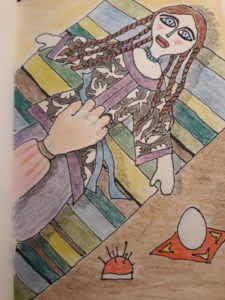
But why did they oppose the marriage? You’ll wonder. First because she hadn’t completed her studies and then, if Henry Fonda was the son of a highly respected civil servant, his mother was only the father’s housekeeper, a mere maid in other words, no one breathes a word about it because it takes place in the upper classes.
So what?
Well, my friend Amina defies her family and marries Henry Fonda who has her live in a nice flat where he has also put his mother as a good Egyptian son that he is, because his father has just died. Mummy cannot live on her own, it is out of the question, and it’s the duty of a son to look after his mother.
As a matter of fact mummy can’t stick Amina; she is from a different social background and you can feel it. Yet Amina becomes pregnant, gives birth to a beautiful son and nurses him while completing her medical studies. Life is hard. Henry Fonda is often away – he makes business, no one can tell what kind of business exactly, and he owns land in the area of the Suez canal. Amina becomes pregnant again and bears a lovely daughter but that doesn’t soften mummy who torments her and Henry Fonda never stands up for her even when he is at home. She even spends a night on the balcony because she dared talk back to mummy. He seems to hold a grudge against her for her being so different from his mother, for speaking French and not liking plastic flowers.
Once more pregnant, she gives birth to twins this time, a boy and a girl. The brood grows up a little and goes to the town’s most expensive school. Now Amina can work and take her doctorate too. She has specialized in oncology and as she does everything very well, she is bright and hated not only by her mother-in-law but also by her colleagues whose corruption she is often a witness of and she can’t keep her mouth shut, which delays her getting her doctorate a lot.
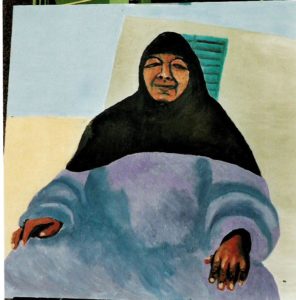
The mother-in-law dies at last.
Meanwhile many things have changed in Egypt. Sadate’s policy has let the Muslim brothers out from behind the bars. They are supposed to be a safeguard against the Marxist peril. They’ll murder their benefactor in the end. Increasing poverty as a result of the open door policy and a fast growing population together with a decreasing schooling rate has thrown many men into the arms of the Gulf countries now in need of labour and they often come back from there bearded and holding religious opinions that were only marginal up to then. Though it has never been written in the law, women cover their heads and soon only Christian women and a few stubborn Muslim women don’t wear the hijab. Amina is one of them. She is a believer and observant but she still thinks religion should be a private matter and that dressing decently is enough.
She learns to drive.
Here is what her day looks like.
She gets up before dawn, says her prayer and then cooks for the day. Mind you cooking in Egypt doesn’t mean steam cooking three vegetables not even five. She wakes her four children up and get them ready before they catch the school bus. Then she takes her car and has words with inconsiderate drivers – I’m well spoken, aren’t I? – then with her colleagues and other neglectful or dishonest members of the staff.
She is back in time to welcome the children home and make their lunch. In Egypt we have lunch at three or four pm.
She pays close attention to the children’s homework.
She takes the husband whenever he comes back home and if he brings back three crates of aubergines from the country, she is up half the night to pickle them before they rot.
But Henry Fonda isn’t well. He’s uneasy with his wife being a doctor. Besides why doesn’t she cover her head like everyone else? Then he disappears and then he comes back and becomes more and more critical, then he abuses her and becomes violent.
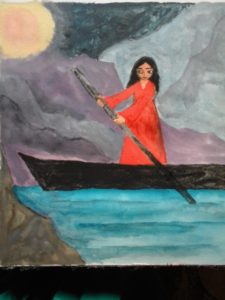
In the end she asks for a divorce. He refuses. As a matter of fact there’s no such thing as divorce in Muslim countries, it’s called repudiation and only the husband can be subject to the verb while the wife can only be its direct complement. So she asks for a repudiation but his Lordship can refuse and let her in abeyance her whole life. If she leaves the marital home, even if her family supports her, he can ask the police to bring her back to the’ house of obedience’. He doesn’t want to repudiate her. He wants to carry on ill treating her with the highest intentions.
Amina discovers then that Henry Fonda has married another woman, he has a right to. She is veiled from head to foot, in the letter box style. He gets a kick out of them. A day when he has been extremely violent, she finally decides to lodge a complaint but it isn’t enough to get a repudiation; all she gets is some sound advice – And if he came to blows, she sparked it off. She should be more understanding and realize that men come under a lot of pressure at work and can be nervous at times.
So she resorts to a new law that was passed in 2000, the khol, a word daunting to pronounce in English. Its root means undressing. It is the right for a wife to shed her husband as you shed a jumper but there are conditions. She must refund her ‘mahr’ i.e. the money the husband gives the wife’s family so that he can marry her, and give up all the rights she might have benefited from if she had been repudiated, alimony for example.
It takes Amina time to make up her mind. She fears for her children.
Finally she decides that money won’t be a problem. The children have grown up a little. She takes a second job, an evening job in a medical analysis laboratory which is beneath her abilities but never mind.
At last she is free despite various attempts at intimidation. She makes up with her family that support her, morally at least. But the father refuses to see his children whom he thinks are corrupted by their impious mother. Of course he doesn’t give a penny for them.
And Amina carries on, erect, tall and proud. The children still attend the same posh school and thank god they do well. Every single day at the hospital where she is now head of department.
She is told she would be much more beautiful with a veil on but she keeps her stand.
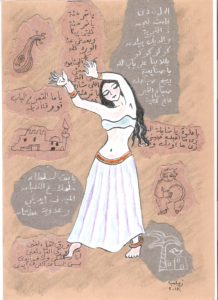
A few men hang round her but she doesn’t trust them any more. She is very careful about what she says and the way she behaves. She is a spouseless woman and as such an easy target to all sorts of greed and scandal mongering. She bawls at everybody and helps everybody discreetly and never gives up standing up for the more destitute patients.
She takes her mother with her and looks after her until she dies. It is hard but she knows it is her duty to do so.
She is old enough to retire but she doesn’t stop working. Despite her fears her children seem to be happily married. She has several grand-children.
But loneliness weighs heavy on her.
I’d like to get her acquainted with the neighbor that lives on the floor below mine in Cairo.
Here I am I who have a French husband who sometimes gets on my nerves but respects me and makes me laugh, when I think of what she has been through and what she hasn’t been allowed to enjoy, I feel sad.
Well, I’m going to say that prayer.
______________________
Voir aussi:
Les Orphelins d’Alexandrie, Roman
Aux Editions DILAP
Egalement disponible en version numérique chez Amazon:
__________________________
Copyright: Editions DILAP – 2021



